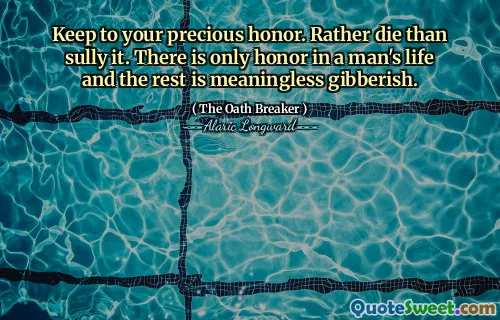
Keep to your precious honor. Rather die than sully it. There is only honor in a man's life and the rest is meaningless gibberish.
This quote underscores the profound importance of personal integrity and honor as the highest virtues worth preserving, even at the cost of one's life. In a world often riddled with gray areas where moral compromise offers shortcuts to success or survival, holding onto one's honor becomes a revolutionary act. Honor, as depicted here, is not merely about reputation but encompasses authentic principles, loyalty, and inner conviction. The statement suggests that by maintaining unwavering integrity, one aligns with a purpose that transcends material or superficial pursuits, which are dismissed as 'meaningless gibberish.' It provokes reflection on what truly matters in life—temporary possessions, social standing, or fleeting pleasures—versus enduring virtues that define character.
In considering this perspective, it raises questions about the real cost of honor, especially in situations where loyalty or social pressures may challenge personal values. The author seems to imply that dying without tarnishing one's honor is a nobler end than living a life compromised by dishonesty or cowardice. This view can inspire individuals to evaluate what boundaries they are willing to uphold in challenging circumstances. However, it also invites debate around the sometimes rigid stance of such an uncompromising ideal, prompting introspection about the balance between honor and pragmatism. Ultimately, the quote champions the idea that a life rooted in true honor is a meaningful life, one that surpasses superficial or transient existence, and invites us to reflect on what truly endures in our own moral landscapes.






